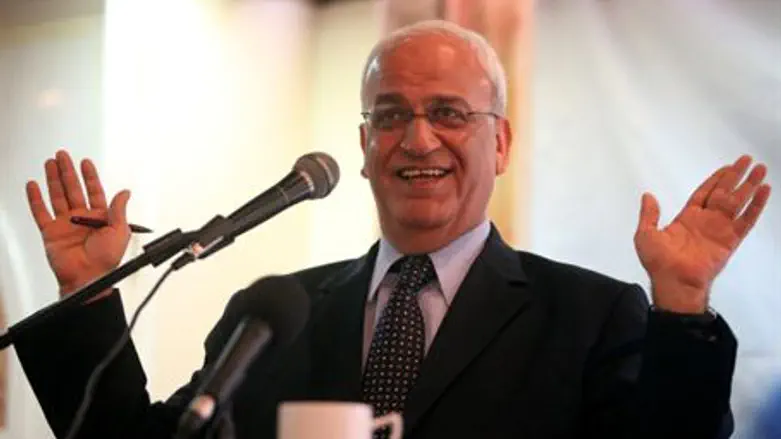
Palestinian Authority leaders marked on Wednesday 46 years since the Six Day War, which began on June 5, 1967, after several tense weeks during which Egypt's President Nasser massed tanks on the border, vowed to destroy Israel and blocked access to the country through the Straits of Tiran. During the ensuing war, won by Israel despite the odds in just six days, Israel liberated Judea, Samaria, and eastern Jerusalem.
As they usually do, the officials slammed Israel’s “occupation” of these areas and called for a two-state solution based on the borders that existed before this day in 1967.
AFP reported that the PLO’s chief negotiator, Saeb Erekat, visited three villages in Judea and Samaria whose populations fled as Israeli troops advanced towards them in the Six Day War. During the visit, he reiterated the PA’s demands for Israel to halt construction in Judea, Samaria and eastern Jerusalem and return to the indefensible pre-war lines as a basis for any peace talks.
He also claimed that Israel “evicted” in 1967 the Arab residents of the three villages and that it continues this policy "in Jericho, Nablus (Shechem) and everywhere else", according to AFP.
PLO executive committee member Hanan Ashrawi slammed Israel's continued construction in a statement marking the anniversary.
"Forty-six years later, the Israeli occupation of 22 percent of historical Palestine still constitutes a humanitarian and political disaster that dominates and controls the lives of the Palestinian people in Palestine and in exile," she said.
"Our struggle will continue until we... witness the establishment of an independent Palestinian state on 1967 borders with east Jerusalem as its capital," Ashrawi said, according to AFP.
Former Israeli Foreign Minister Abba Eban called the pre-1967 borders “Auschwitz borders” because Israel’s withdrawing back to these borders would guarantee its destruction.
Tourism Minister Uzi Landau quoted Abba Eban during a cabinet meeting last week, and later said in an interview that the pre-1967 borders are no less Auschwitz borders today than they were 46 years ago.
"Before '67, they didn't have Katyusha rockets and missiles to the extent owned today by Hizbullah in the north and Hamas in the south that constitute a strategic threat to Israel. One thing must be clear: A Palestinian state is not the solution," said Landau.
The peace talks between Israel and the PA broke down in 2010, because PA Chairman Mahmoud Abbas refused to negotiate with Israel even though it agreed to his precondition and froze construction in Judea, Samaria and eastern Jerusalem for 10 months.
Instead, he has continued to impose preconditions on talks with Israel, including a demand that Israel release terrorists who were jailed before 1993, freeze construction for a second time and even present a map of the future Palestinian state before any negotiations take place.
On Tuesday, Abbas placed the responsibility for the stalled peace talks on Israel, claiming that the "ball is in Israel's court".
Prime Minister Binyamin Netanyahu issued a call of his own to Abbas on Wednesday, telling him during a speech in the Knesset to “give peace a chance.”
"We are in favor of starting negotiations immediately without preconditions,” Netanyahu said.
